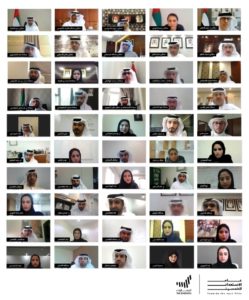UAE Government Charts Path For Infrastructure, Digital Transformation And Environmental Sustainability For Next 50 Years
Over 600 ministers, senior federal and local government officials, secretaries-general of Executive Councils and a group of experts and specialists held in-depth consultations for four days to discuss the path for infrastructure, digital transformation and environmental sustainability.
The meetings were in implementation of directives given by His Highness Sheikh Mohammed bin Rashid Al Maktoum, Vice President, Prime Minister and Ruler of Dubai, to strengthen government integration to chart the future of the UAE and lay down axes and components of the comprehensive development plan for the next 50 years. They were also held within the efforts of the 50-year Development Plan Committee, under the chairmanship of H.H. Sheikh Mansour bin Zayed Al Nahyan, Deputy Prime Minister and Minister of Presidential Affairs, to develop plans in five vital sectors – infrastructure, housing, environment, water and food security, and digital infrastructure and artificial intelligence, AI.
Participants discussed the main proposals and recommendations for developmental initiatives that improve government work, develop the community and leverage the economy during the next development journey. The meetings came out with 45 detailed ideas which will be put to public discussions to engage members of the community in the designing process of the next 50-year plan.
Participants stressed the importance of designing a new vision for cities, transportation and urban expansion, and the transformation to smart cities capable of accommodating the large increase in population numbers, in addition to developing new technologies in building and construction by finding innovative solutions to various challenges, identifying opportunities, and developing comprehensive new policies that achieve integration in the work of government entities, and providing accurate data with high speed and quality.
The meeting touched on the challenges facing the housing sector, and the need to develop innovative designs that contribute to providing land and meet future aspirations, relying on best international practices in implementing housing projects and strengthening partnership and integration with leading institutions in the private sector in securing various needs.
In the food security track, the participants discussed ways to unify public policies at the level of government agencies, to support national products and entrench their position at the global level.
They also explored mechanisms and solutions for investment in modern agricultural projects and support for the agricultural scientific research system in partnership with the private sector.
Participants in the digital infrastructure and AI track touched on the importance of developing and adopting future technology, actively participating in the fourth industrial revolution, raising the quality of Internet services in a way that contributes to reducing their costs, and attracting investments and innovations.






